Like an oasis in the desert
Eszter Neuberger's award-winning article about people from neglected neighborhoods in Hungary
The dusty gardens, packed with junk or the impenetrable weed-jungle are usual sights in any of Hungary’s segregated areas – even though tamed gardens with cultivated plants apart from being beautiful would be an important food resource for families most in need. Our report presents poor people who proudly guided us in their gardens filled with flowers and vegetables, where they like to spend time because every inch of feels their own. Gardening, however tired they might be after a day of work, is relaxing for both of them.
After the dusty, bleak streets and the junk-packed, bare yards of the houses of the Tabán settlement of Monor, entering the garden of Józsefné Joli Oláh feels like we are in an oasis. On top of that, the garden is the most beautiful at this time of the year because most plants the woman planted in her yard and tends carefully are blooming now. Her favourites are the different kinds of roses – we sit down to talk on her patio overgrown with rambler roses.

Garden in the Tabán settlement of Monor in Hungary: Photo: © Hajdú D. András
It can be seen from the greening garden that it belongs to a poor house: instead of uniform, fashionable furniture there is a scrap sofa in one of the shady corners, and there is no velvet-soft lawn either. Still, it is evident that the owner tends it regularly, has arranged it consciously, and probably likes to spend time in it.
55 years old Joli is one of the local prime movers of the Jelenlét Program [Presence Program] of the Charity Service of the Order of Malta, active in the Roma settlement; as an employee of the organization she has a more computable income compared to other locals. Even this way, they do not live on more than 70-80 thousand forints per month with her unemployed husband; they are as poor as the average Tabán citizens. Yet, when we tell on the street to a young woman that we were looking for poor households with beautiful gardens, she replies: “Only Joli has a beautiful garden here.”
‘It just relaxes me.’
Joli does not solely keep her own garden in order: with her leadership the vegetable bed on the central yard of the Jelenlét Program of the Charity Service of the Order of Malta has been filled with plants. Peas, beans, potatoes and other vegetables grow in them that Joli and the others working with the garden can take home for themselves.
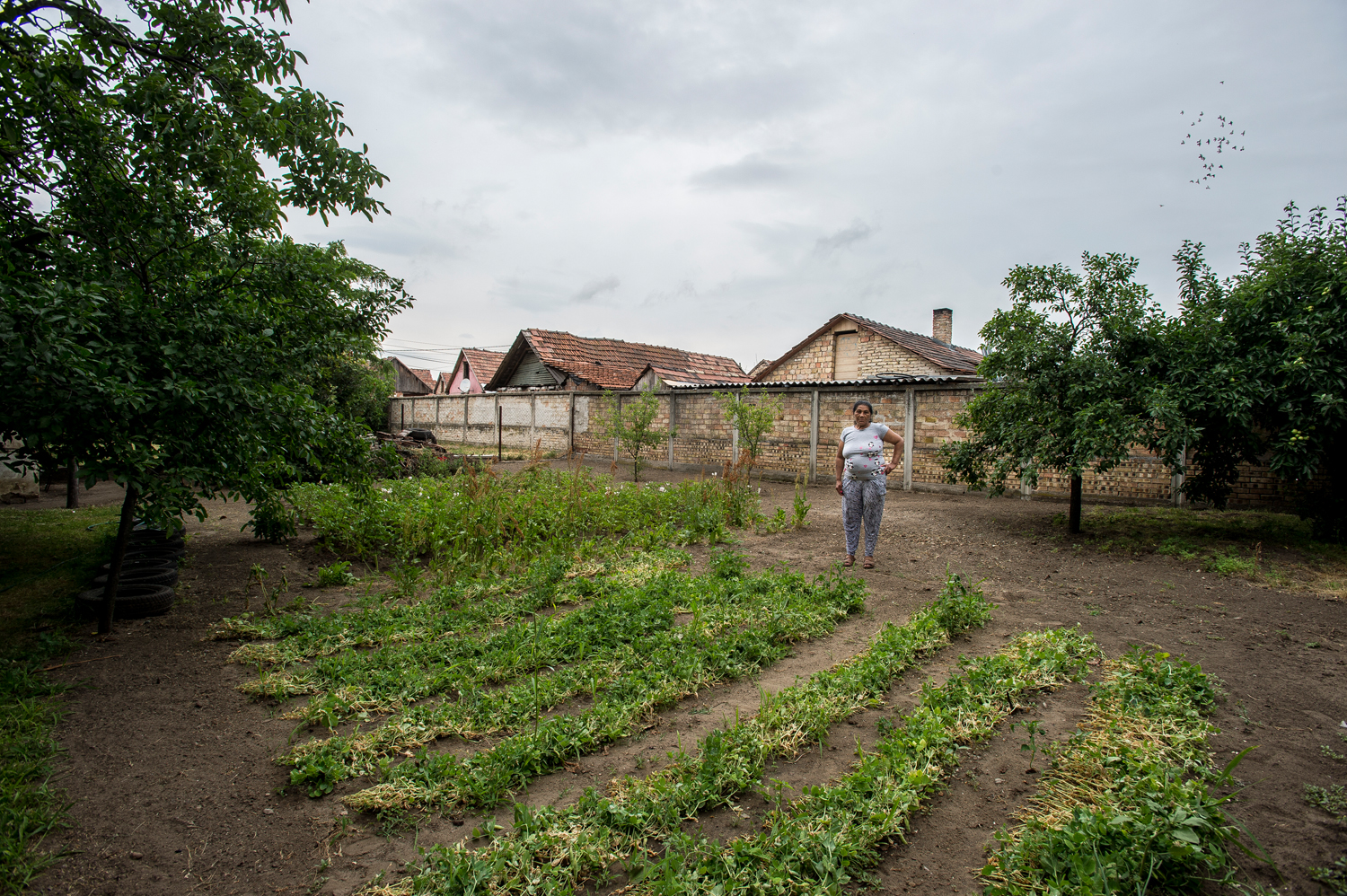
Joli in the community garden of the Charity Service of the Order of Malta, active in the Roma settlement of Monor. Photo: © Hajdú D. András
Even as much peas that are enough for one dish is huge help if they do not have to buy it, however, Joli does not do it only because of it. “Gardening just relaxes me,” she says.
She fiddles around in her own garden when she can, an hour a day, especially in the summer when the plants have to be watered so they are protected from drying out. For this at Joli’s there is no water-tap in the garden, and the woman does not want to increase her water bill with this, so she carries the water from the nearest common well. It can take fifteen turns a day to fill the tub at the back of the yard with 5 litre watering cans, from which she waters the plants.
“There used to be a lawn in my garden but a few years ago the cesspool sunk in and the sewage water seaming in the soil killed off the grass. Since then I do not really like to plant vegetables either,” Joli explains. She cannot re-grass the yard precisely because of the troubles of watering because she would have to water it twice a day in the early period which would require superhuman efforts without a tap in the yard.
‘I saw my mother doing it.’
Joli likes to involve her grandchildren in gardening, both the older one, Józsi and the younger one, Krisztián because she sees that activities in the garden interest them beyond measure.
“The kids asked curiously during planting in the garden where I learnt it from. I said: I saw my mother doing it,” – tells Joli, who believes that the older generations even though they were just as poor were much more active and had higher standards than adults do today. Her father, for example, did basketry while her mother kept the household, which of course included maintaining a vegetable garden, as well.
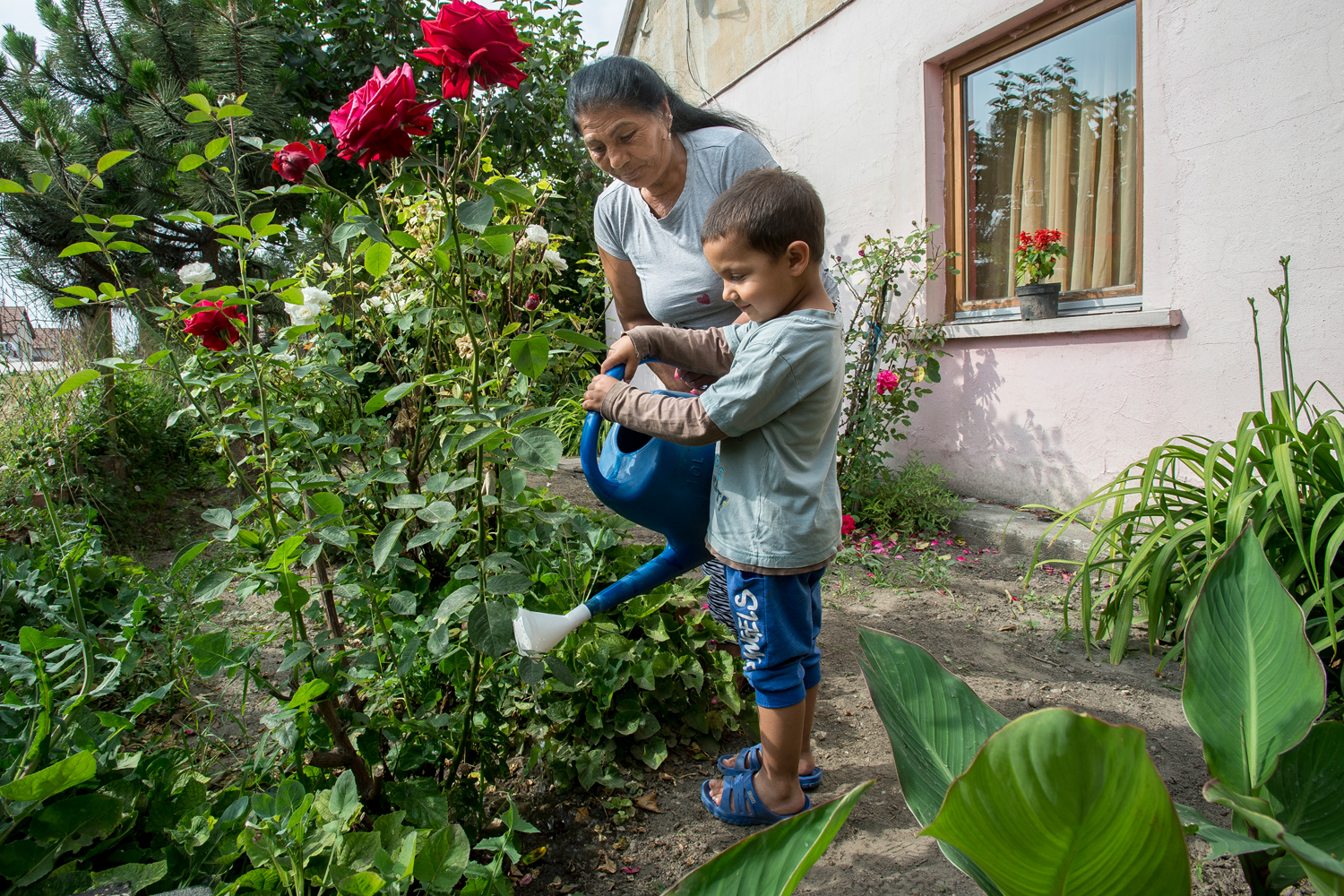
Joli likes to involve her grandchildren in gardening. Photo: © Hajdú D. András
Joli wishes to pass on her love of gardening to the youth of the settlement, for which it is a good start for her to have the kids as regular help in keeping the garden of the Order of Malta. Now that the summer holiday has finally begun, there is time for shelling of peas or a bit of pulling weed between the programs of the local study hall.
‘I even upload it to Face.’
We are at Told in Hajdú-Bihar county, in a small village of 350 citizens close to the Romanian border when we enter the yard of Angéla and her husband, Imre. The couple blushingly invite us in the house that belonged to Angéla’s father, deceased one year ago, before they moved here.
“There are still some things to repair on the house but you cannot imagine its condition before. Here, for example, used to be an entire rat’s nest,” – Imre points at the wall of the hallway. The couple started renovating the house by themselves, and they left their former home to their daughter and her family to live in.
However, from the adobe house that is indeed in poor condition, we return quickly to the yard, because here is the vegetable garden and domestic animals live here, as well.
“Parsnip, onion, purple onion, potatoes, and we had salad and peas, too, but those are already out,” – Angéla lists what grows in the garden this year. The woman sows the greater part of the seeds in already November, as she puts it to have her garden beautiful by the time others start sowing.
“I even upload my salad, my vegetable garden to Face for others to see, and then I get many likes. I like to brag how beautiful my vegetables are,” Angéla tells and later on she shows us one of these Facebook posts as well: there are potato plants greening wildly in the picture.
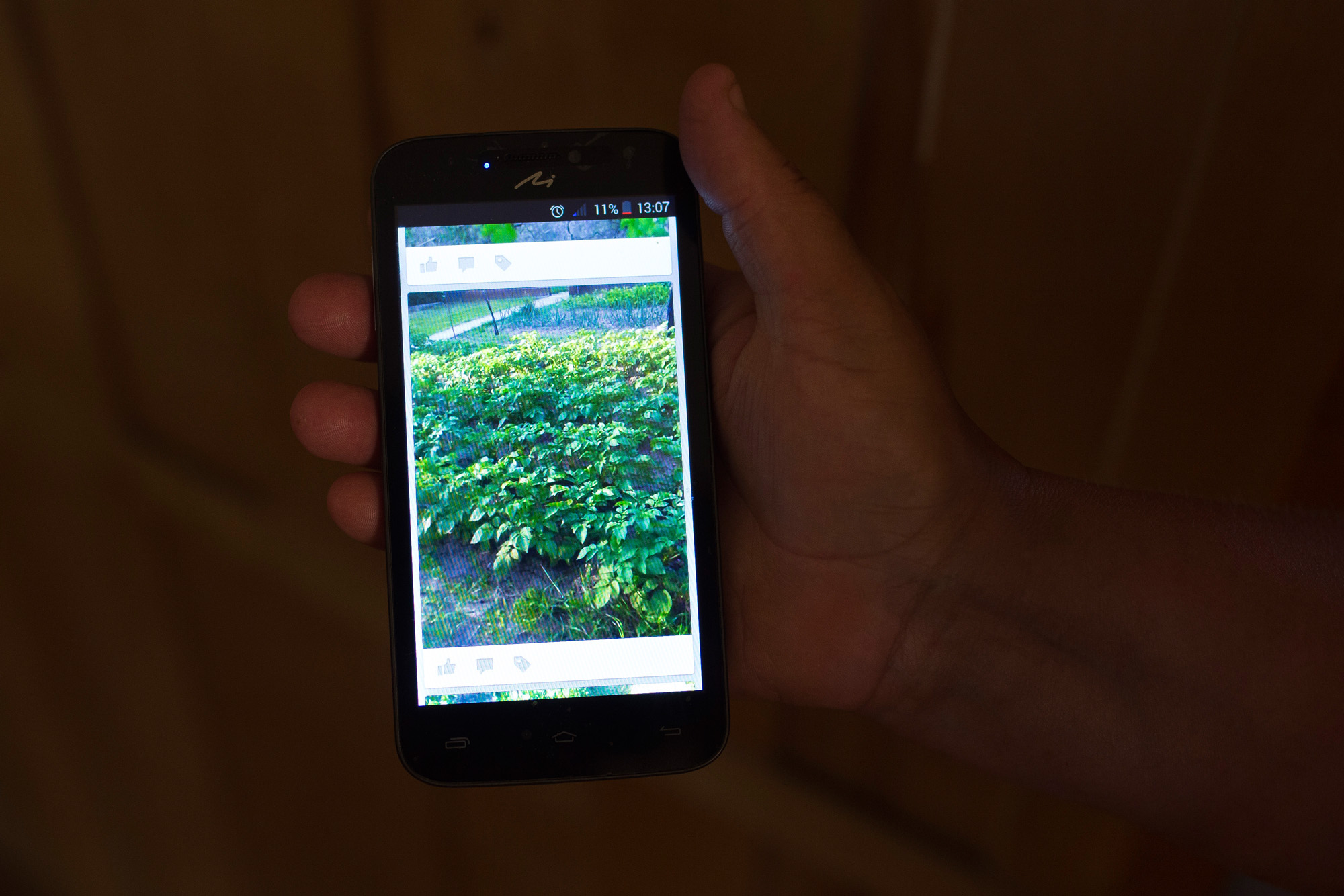
Angéla shows one of her Facebook posts of her garden.
‘We learnt that we can save a lot of money.’
Angéla, as a contrast to Joli, did not learn gardening from her parents: she was raised in an institute until she was 12, then by her father and stepmother, but they did not cultivated any plants. “We simply learnt with my husband that we can save a lot of money if we have to spend less on vegetables and meat,” – she says.
Angéla and Imre have domestic animals, too: earlier they kept pigs, now they keep chickens. One chicken costs 370 forints and it grows up in 7-8 months eating cob-meal, chicken food and wheat. They have both young and grown-up animals right now, the latter ones even lay eggs that Angéla usually gives to her daughters living in the village.
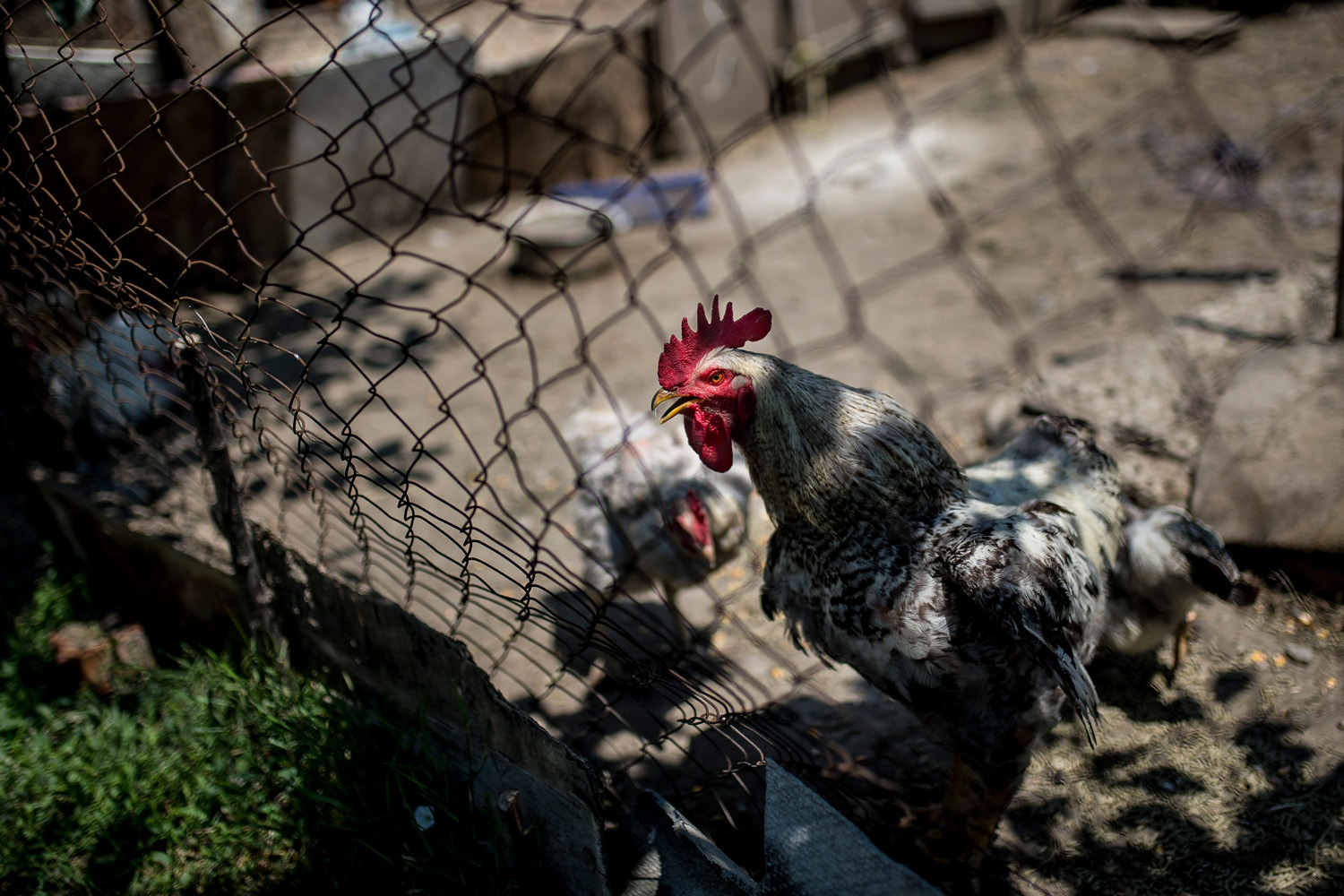
Keeping animals has its own cost, but also its benefits. Photo: © Hajdú D. András
Keeping animals has its own cost: forage costs 11 thousand forints a month for Angéla and Imre, and they always put aside this money at the beginning of the month. Their income is composed of Imre’s public worker salary, child benefit Angéla gets after her 2.5 years old child, family allowance, and the orphan care of Angéla’s sibling, and it makes all together 130 thousand forints a month for a four-member household.
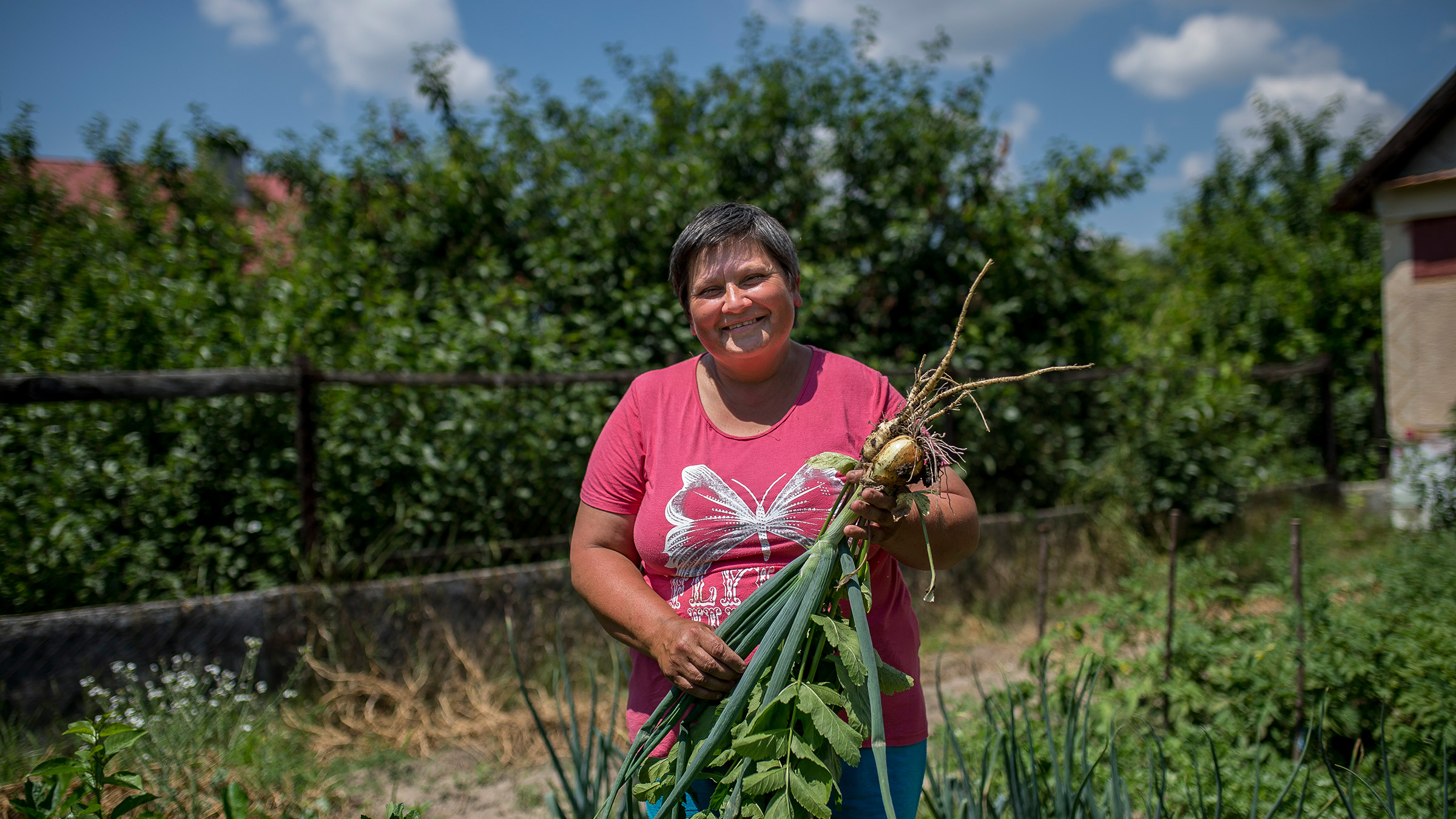
Angéla in her garden. Photo: © Hajdú D. András
They do the garden work together with Imre – the most time and energy consuming of which is watering, since similarly to Joli’s garden, there is no yard tap at Angéla’s either, moreover, there is no piped water in the house. The nearest well is 50 metres away; the couple carry water from here, ten litres per turn, every day for the plants, the animals and obviously for the four person household. In case it is laundry day – which happens three times a week – the water carried from the well might reach 100 litres.
‘…they find a way even in the greatest poverty.’
“Those with the ability of self-sustaining will find a way even in the greatest poverty to help themselves. They will be the ones who have a vegetable garden at the end of their yard, with potatoes and vegetables in it,” – Nóra L. Ritók, founder of Igazgyöngy Alapítvány (Real Pearl Foundation), active in Told, explains. She knows Angéla’s family well.
According to L. Ritók, there are people for whom gardening is part of the family traditions – like we saw in the case of Joli – and they know for generations that it is easier to feed the family if they grow some basic products themselves. However, in segregated areas similar to the ones in Told and Monor there are many people who did not inherited these traditions – their gardens are bleak and dusty like in the Tabán of Monor, or impenetrable mess like some of the yards in the street inhabited with Roma families. Meanwhile, these households are the ones that should not have to buy potatoes and onions in the store at the end of the month.
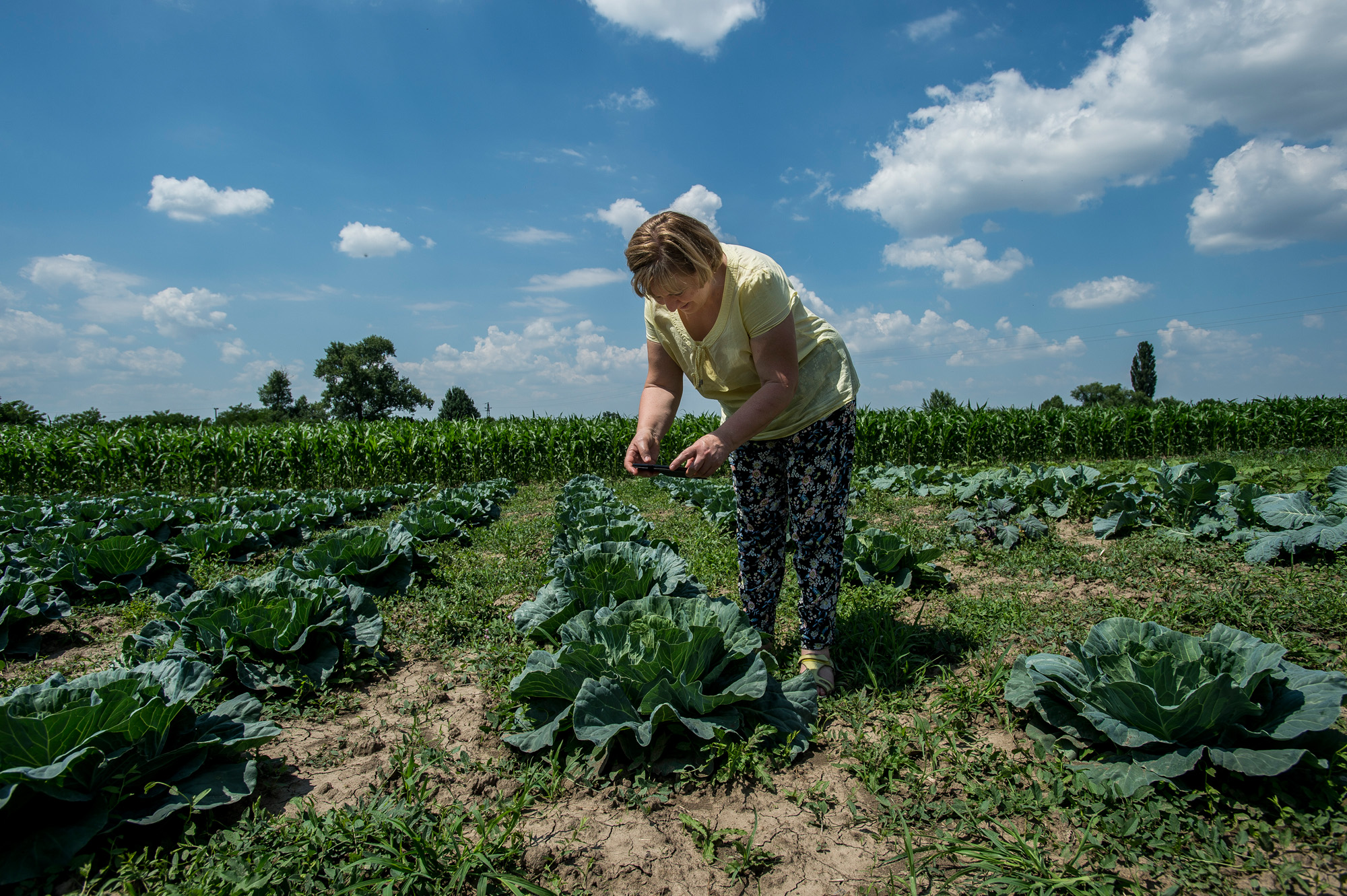
Nóra L. Ritók takes photos of huge cabbages in her foundation’s communal garden. Photo: © Hajdú D. András
This can be changed, of course. Similarly to numerous poor settlements, there is a communal garden in Told, too – operated by Igazgyöngy Alapítvány – where the locals can work as employees, legal casual workers or volunteers. Many of them learn here the working process of plant cultivation, and then if possible they get seeds and seedlings that they can plant at home in the garden they dug up. Nóra L. Ritók has no illusions: there are people every year who sell the seeds they receive, and cook the potatoes at the end of the month instead of planting them. Nóra had a pleasant surprise even during our stay when after entering a fenceless weedy garden she found a corner in which widely greening squash, onion and carrots grew.
“Look, here is another vegetable garden! I did not even expect it.”
Original in Hungarian. First published on 10 July 2017 on abcug.hu.
Translation into English by Eszter Greskovics.
This text is protected by copyright: © Eszter Neuberger. If you are interested in republication, please contact the editorial team.
Copyright information on pictures, graphics and videos are noted directly at the illustrations. Cover picture: © Hajdú D. András.
Journalism Award “from below”
The Journalism Award “from below” for respectful poverty coverage was created in 2010 as a project of the Austrian Anti Poverty Network. It is aiming to promote a kind of journalism which reflects the many facets of poverty, treats people concerned in a respectful way, allows their voices to be heard, lets their realities become visible and examines the societal causes of poverty. The prize “from below” is designed by people experiencing poverty and by journalists. The jury exclusively consists of people experiencing poverty.
Since 2015, with the support of the ERSTE Foundation and the EAPN (European Anti-Poverty Network), an international dissemination of the prize has been in progress and workshops have been organised. Most recently, the Journalism Award “from below” was presented for the first time in Hungary, Croatia, Finland and Iceland. This article by Sandra Knopp and Udo Seelhofer was awarded in the online category in 2017.